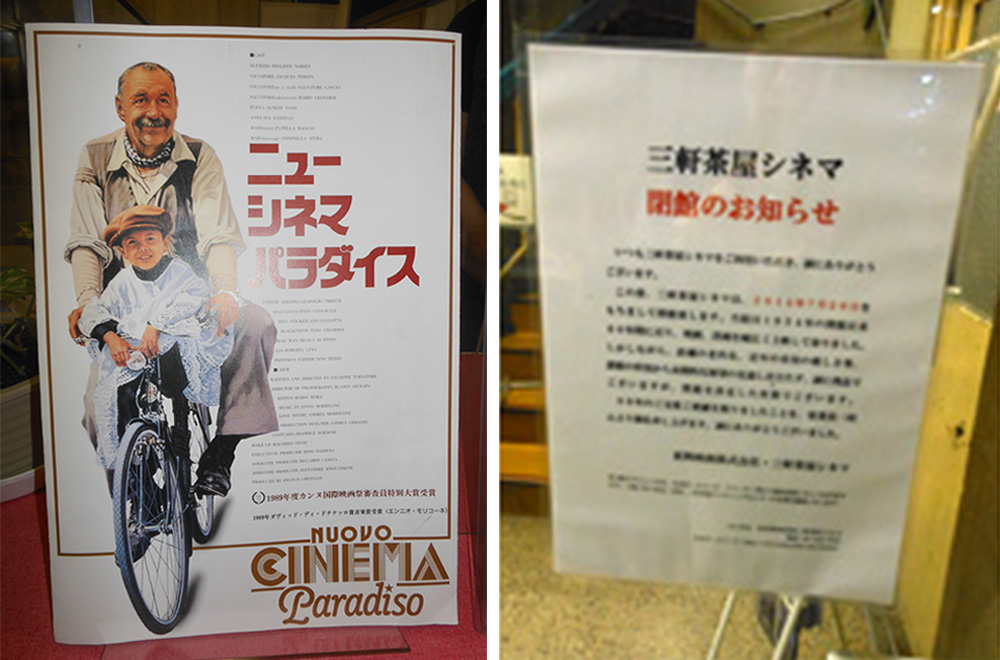![[Mini Theater Revisited] No. 23: Recovering from the movie town of Ginza... Part 12: True story version of "Cinema Paradiso" - The end of two masterpiece theaters](https://cinemore.jp/images/df3aa9bfc1867e115c3d9590795e48475f22a3f637b22822a38dc587029bc049.jpg)
[Mini Theater Revisited] No. 23: Recovering from the movie town of Ginza... Part 12: True story version of "Cinema Paradiso" - The end of two masterpiece theaters
Sangenjaya Cinema, loved by locals
Sangenjaya Cinema closed on July 20, 2014. It is located a 5-minute walk from Sangenjaya Station on the Denentoshi Line, and opened in 1954. There was actually another old movie theater (Sangenjaya Chuo) close to this movie theater, but it closed in February 2013. This is a movie theater in a detached house, which is rare these days, and the signboard with a picture of a pink and blue raincoat was the landmark.
One and a half years have passed since the Kappa Theater closed. As if to follow suit, Sangenjaya Cinema also reached its final day.


◉Sangenjaya Cinema closed on July 20, 2014. An aged chair is also a sign of attachment. ``Cinema Paradiso'' was screened to close the theater.
`` Cinema Paradiso '' was screened for one week from June 28th (`` Himawari '' was also screened). When I visited the theater on the final night of the screening, all 155 seats were almost full. I live along the Den-en-toshi Line, so I only occasionally go to the theater, but that night it was unusually lively.
When the movie begins, it becomes clear that the Paradise Theater in the play and the movie theater showing this movie were breathing the atmosphere of the same era, and the story becomes strangely realistic. The scene in the second half, when the main character returns to his hometown and visits the ruined Paradise Theater for the first time in 30 years, was truly heartbreaking.
From this point on, the sound of sniffling can be heard in the theater, and the sound reaches its climax during the furious climax, which features numerous love scenes that had been cut out by censors.
When the end mark appeared, there was a big round of applause from the audience.
Even after the movie ends, the audience members are reluctant to leave, taking pictures of the theater and talking to movie theater workers in the lobby.
"It's about this movie theater itself."
Some people said that as they headed for the exit.
In the hallway, flyers for films that have been screened in recent years are posted, and some people are eagerly looking at them. There was even a man whistling Ennio Morricone 's theme song for the movie as he left, making me realize once again the enduring popularity of this movie.
On the other hand, the announcement announcing the closure of theaters speaks of the difficult situation in which movie theaters find themselves.
“Since our opening in 1954, we have screened a wide range of Japanese and Western films for 60 years.However, due to various circumstances, including aging equipment and the recent harsh market conditions, we are unable to maintain our long-term prospects. It is with great regret that the outlook remains uncertain, but we have made the decision to close the facility. All of our employees would like to express our sincere gratitude to all of our employees for their support over the past 60 years."
I had never talked to anyone at the theater before, but that night I took the plunge and asked them.
When I asked Yosuke Ryuzaki, a young sales representative at Toko Eiga, which operated the theater, ``What is the appeal of ``Cinema Paradiso''?'', he answered as follows.
``I've watched it many times myself, and I guess what I'm saying is that good things are good.It depicts nostalgia, but it also conveys a Arrival beyond nostalgia, about moving forward firmly. I think that there"
When this theater first opened 60 years ago, it was a Toei-affiliated movie theater, and in recent years it has been used as a second theater (a theater that screens movies released on roadshows a little later), showing double features of Western and Japanese movies. was. The audience was wide-ranging, from seniors to young people, but most of them seemed to live in the neighborhood, and the rough-and-tumble ones stood out. ).
That night's ``Cinema Paradiso'' was a film screening, and no digital equipment was used. Although the recent shift to digital movies is not the only reason for the closure, the transition from film to digital must have had a considerable impact on these old movie theaters.
Scheduled to be screened during the final nine days is the Japanese film `` And I Become a Father '' (13th), which will also be screened with `` Nobo no Shiro '' (11th).
``The theater was more like a Nibankan than a masterpiece theater, so last year's ``And I Became a Father'' was my last production.''
Ryuzaki said so.

